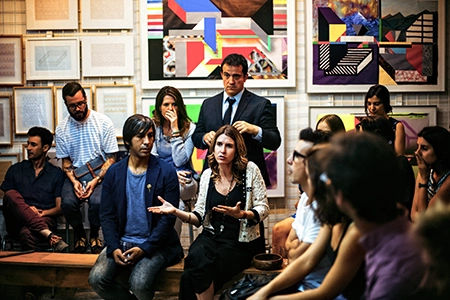London’s cosmopolitan character shines brightly, enriched by a diverse mosaic of cultures worldwide. Among these, the Turkish-speaking population contributes a vivid splash of colour to London’s cultural quilt. Translating from Turkish into English goes beyond mere words—it acts as a bridge for cultural comprehension and unity in this dynamic city. This journey delves into how translation is critical in knitting together communities and nurturing a climate of mutual admiration.

Ready to Connect Cultures?
Central to our purpose is the conviction that language should not obstruct the path to insight and bonding. Suppose you aim to close the cultural divide with the help of translation. In that case, we are here to support you with professionalism. Our skilled translators are prepared to deliver precise and culturally aware translations from Turkish into English. Our team can assist you with business, legal, or personal documents.
The Role of Translation in Cultural Exchange
Translation is pivotal at the intersection of languages, driving forward cultural exchange and dialogue. The significance of translating materials from Turkish to English becomes especially apparent in uniting people through cultural events and exhibitions that honour Turkish heritage in London. By translating these experiences into English, London’s English-speaking community is invited to connect with, understand, and value the depth of Turkish culture. This process showcases the skill and commitment of translators in capturing and conveying the subtleties of one language into another, thereby enriching London’s multicultural landscape.
Unlocking Worlds Through Literary Translation
Translating literary works, including novels, poetry, and plays, promotes cultural exchange. It makes global literature’s rich and diverse world accessible to readers everywhere. Famous writers like Russia’s Leo Tolstoy, Japan’s Haruki Murakami, and Colombia’s Gabriel García Márquez have seen their works translated into many languages. This translation effort allows people from different backgrounds to explore and cherish various countries’ distinctive cultural nuances and narrative traditions.
Bringing the World Closer through Film and Media Subtitling and Dubbing
The global film and TV industries have greatly benefitted from advances in translation, particularly through subtitling and dubbing methods. This process allows audiences worldwide to access content produced in languages other than their own. It plays a crucial role in promoting cross-cultural understanding and appreciation. The significance of translation in this context can’t be overstated, as it enables films and series to transcend language barriers, thereby expanding their audience reach.
A prime example of translation’s impact is observed in the international acclaim of South Korean entertainment, such as the movie “Parasite” and the series “Squid Game.” These productions have garnered global audiences and critical acclaim, largely due to effective translation that made them accessible and relatable to viewers worldwide. This success underscores the importance of skilled translation in the film industry. It highlights how it can introduce diverse narratives and perspectives to a broad audience, fostering a richer global cultural exchange.
Bridging Time with Translation of Historical Texts and Manuscripts
Translating ancient manuscripts, religious texts, and historical documents is crucial in disseminating knowledge and cultural heritage across civilisations. Such translations have been instrumental in bridging the gap between past and present, allowing us to understand ancient peoples’ thoughts, beliefs, and practices. A prime example of this is the translation of the Rosetta Stone, which served as a key to deciphering the mysteries of ancient Egyptian language and script, thereby opening up a wealth of historical and cultural knowledge to the modern world.
Similarly, translating the Bible into numerous languages has significantly impacted the spreading of religious beliefs and cultural practices around the globe. These translations have facilitated the access of sacred texts to a broader audience and played a pivotal role in shaping cultures, traditions, and societal norms. Through the diligent efforts of translators over the centuries, these invaluable texts continue to foster understanding, dialogue, and connection among diverse peoples, highlighting the enduring power and importance of translation in preserving and sharing our collective human heritage.
Facilitating Global Insight through Academic and Scientific Exchange
Translation is indeed indispensable in the sphere of scientific and academic knowledge sharing. Translating research findings, scientific discoveries, and scholarly articles into various languages makes critical information accessible to researchers, scholars, and practitioners globally. This accessibility is crucial for several reasons:
- Promotes Diversity of Thought: Translation allows for cross-pollinating ideas and methodologies from different cultures and backgrounds, enriching the global research community.
- Enhances Collaboration: It facilitates international cooperation, enabling scientists and scholars worldwide to collaborate more effectively on research projects, papers, and innovations.
- Accelerates Discovery: Making scientific knowledge widely available accelerates the pace of discovery and development in various fields, as researchers can build on the work of their international peers without language barriers slowing them down.
- Ensures Equity in Information Access: Translation democratises access to scientific knowledge, ensuring that breakthroughs and advanced research are not confined to those who speak certain languages.
- Cultural Sensitivity and Inclusion: Translated materials can be adapted to include cultural nuances, making them more relatable and understandable to diverse audiences, thereby promoting inclusivity in scientific discourse.
The role of translation in science and academia cannot be overstated. Breaking down language barriers significantly advances science and technology, fostering a more interconnected and collaborative global research community.
Nurturing Global Peace through Translation in International Diplomacy and Relations
In international diplomacy, translation is critical and nuanced. Accurate and sensitive communication is paramount in diplomatic interactions, where the stakes are often high, and the nuances of language can significantly impact outcomes. Translators and interpreters play a vital role in this context by facilitating clear and effective communication between countries. Their work helps navigate linguistic and cultural differences, ensuring all parties understand discussions, negotiations, and agreements.
Translating legal documents, treaties, and diplomatic correspondence is particularly crucial. These texts often contain complex legal language and specific terms that require precise translation to avoid misunderstandings or misinterpretations. A well-translated document ensures all parties have a clear, unambiguous understanding of their rights, obligations, and agreement terms. This clarity is essential for fostering trust, respect, and cooperation among nations.
Moreover, skilled translators and interpreters can convey not just the literal meaning of words but also the subtleties of tone, intent, and cultural context. This level of sensitivity and understanding can be instrumental in smoothing over potential conflicts, promoting peace, and facilitating international collaboration.
In essence, translation services in diplomacy are not just about converting words from one language to another; they are about bridging divides, enhancing mutual understanding, and contributing to global peace and cooperation. The work of translators and interpreters in this field underscores the profound importance of language services in maintaining and fostering international relations.
Enhancing Cultural Tourism through Immersive Translation Experiences
Translation services play a vital role in cultural tourism by making historical sites, museums, and cultural experiences accessible to tourists from different languages. Through translated guides, informational plaques, and audio tours, visitors can fully appreciate the significance and context of cultural attractions, enhancing their travel experience and fostering a greater appreciation for the host country’s heritage.
Overcoming Cultural Barriers Through Translation
Cultural barriers can be invisible yet palpable walls that divide communities. Skilled translators act as architects, dismantling these walls by adeptly sharing stories, traditions, and the cultural subtleties embedded in the Turkish language. Turkish proverbs find resonance in English-speaking hearts through their precise and sympathetic conveyance, and complex concepts are rendered into accessible insights. Their work interprets words and weaves the emotional and intellectual threads that bind societies.
Overcoming cultural barriers through translation is a nuanced process beyond mere word-for-word conversion. It necessitates a profound comprehension of the cultural contexts in both the source and target languages. Here is a concise exploration of how translation aids in surmounting cultural obstacles:
- Enhancing Mutual Understanding: Translation bridges cultures, conveying not only language but also the subtleties and contexts of the original message. This fosters mutual comprehension and respect among individuals from diverse cultural backgrounds.
- Facilitating Global Communication: In our interconnected world, translation facilitates communication across borders, enabling businesses, governments, and individuals to engage and collaborate more efficiently.
- Preserving Cultural Heritage: Translation plays a pivotal role in conserving and disseminating cultural heritage by making literary works, historical texts, and traditional knowledge accessible to a broader audience. This ensures the preservation and celebration of cultural identities.
- Supporting Multicultural Education: By translating educational materials and literature, students and educators gain exposure to varied perspectives and knowledge realms, promoting multicultural education and empathy.
- Aiding International Diplomacy: Translation is indispensable in international diplomacy, where precise and clear communication can enhance international relations and collaboration. It assists in navigating the intricacies of cultural sensitivities and legal nuances.
- Promoting Access to Global Markets: Translation is indispensable for businesses entering and thriving in global markets. It enables companies to communicate their brand and products effectively to customers from diverse cultural backgrounds, mitigating potential cultural misunderstandings.
- Enhancing Artistic and Cultural Exchange: The translation of films, music, and art opens avenues for cultural exchange, allowing individuals to immerse themselves in and appreciate the artistic expressions of varied cultures.
- Facilitating Travel and Tourism: Translation services in the tourism sector, such as multilingual guides, brochures, and websites, assist travellers in navigating foreign cultures and experiences, enhancing their travel encounters.
- Supporting Legal and Medical Interactions: In legal and medical settings, translation ensures that individuals receive necessary information and services in a language they comprehend, which is crucial for fairness, safety, and well-being.
- Encouraging Technological Advancement: Translation of technical documents, software, and digital content facilitates the dissemination of technological innovations and best practices across cultures, propelling global advancement.
By transcending cultural barriers, translation fosters communication and understanding and enriches global society by championing diversity, inclusivity, and collaboration.
Translating Turkish Literature and Arts to English
Turkish literature and arts profoundly reflect the nation’s spirit, chronicling centuries of history, emotion, and human experience. They encapsulate a unique blend of Eastern and Western influences, reflecting Türkiye’s geographical and cultural positioning. Translating these works into English opens a window for global audiences to explore the rich tapestry of Turkish culture. Masterpieces by poets like Nazım Hikmet and novelists such as Orhan Pamuk become accessible to English-speaking audiences, allowing them to embark on a literary journey through the landscapes of Anatolia and beyond.
The importance of quality translation in this process cannot be overstated. Translators’ meticulous efforts preserve the nuanced beauty of Turkish literature and art and convey it to a wider audience. These translations bridge cultures, fostering a deeper understanding and appreciation of Türkiye’s creative legacy. For Londoners and English speakers worldwide, these translated works offer an opportunity to engage with the diverse themes and rich narratives that define Turkish artistic expression.
As highlighted in sources such as Britannica and Wikipedia, Turkish literature encompasses various genres and styles, from the epic tales of the Ottoman era to modern novels and poetry that reflect contemporary Turkish society. Similarly, as detailed in Advantour, Turkish art showcases a vibrant heritage that spans from the intricate designs of Central Asian tribes to the sophisticated expressions of the Seljuks and Ottomans.
Through the lens of translated literature and arts, English-speaking individuals gain invaluable insights into the complexities of Turkish culture, its historical depth, and its perpetual evolution. This cross-cultural exchange enriches the global arts scene, demonstrating the universal power of storytelling and artistic expression to connect and resonate with people across different backgrounds and geographies.
The Impact of Translation on Community Integration
The impact of translation on community integration extends far beyond the mere conversion of text from one language to another; it is about building bridges between cultures and fostering an environment of inclusivity and mutual respect. Here’s an expanded discussion on this topic:
Facilitating Access to Public Services
Access to public services is a fundamental right for Turkish-speaking residents in London and speakers of other languages. Translation ensures these individuals understand and use healthcare, social services, and emergency assistance. This helps meet their immediate needs and promotes their long-term well-being within the community.
Enhancing Educational Opportunities
Education is a cornerstone of community integration, offering individuals the knowledge and skills to thrive. Turkish-speaking students and their families can fully participate in the educational process by translating educational materials, syllabi, and school communication. This includes engaging with teachers, participating in parent-teacher meetings, understanding curriculum requirements, and ensuring that language barriers do not hinder academic achievement.
Promoting Civic Participation
Civic participation is essential for a vibrant and functioning democracy, and translation is key in ensuring all community members can participate actively. This includes access to translated voting materials, information on local government initiatives, and opportunities to engage in community dialogues. By providing these resources in multiple languages, societies affirm the value of every voice, regardless of the language spoken.
Supporting Economic Integration
Economic integration is crucial for newcomers to feel part of their new communities. Translation services can aid this process by making job postings, employment services, and business resources accessible to non-English speakers. This helps individuals find employment, contribute economically, and benefit the broader community by fostering a diverse and dynamic workforce.
Encouraging Cultural Exchange
Translation facilitates cultural exchange by making the rich tapestry of the world’s cultures accessible. Events, festivals, and cultural programs accessible through translation allow a deeper understanding and appreciation of different cultures. This enriches a community’s cultural landscape and promotes social cohesion and mutual respect.
Ensuring Legal and Safety Information Accessibility
Access to legal and safety information is critical for all community members. Translation services ensure that Turkish-speaking Londoners and those who speak other languages are informed about their rights, legal obligations, and safety protocols. This is particularly important in emergencies, where access to information in a language one understands can be life-saving.
The Future of Turkish-English Cultural Bridges
Envisioning the trajectory of Turkish-to-English cultural exchange in London, we anticipate transformation guided by technological advancements and innovative community engagement. Machine translation, artificial intelligence, and collaborative platforms will streamline translation processes, potentially enriching cultural bridges further. Yet, the human elements of empathy, context, and cultural sensitivity will remain indispensable, affirming the relevance of our profession in an evolving London landscape.
Final Words on Bridging Cultures Translation
In conclusion, Turkish-to-English translation extends well beyond words—it is a linchpin for unity and cultural richness in London. It symbolises our dedication to inclusivity and the shared human experience, underscoring the commitment to maintain the integrity of this important work. As we foster closer ties and deeper understanding among communities, we translate languages and the essence of our diverse heritage. Continuing these translation efforts propels us towards a future where every voice is heard and every culture is cherished within London’s dynamic chorus.



